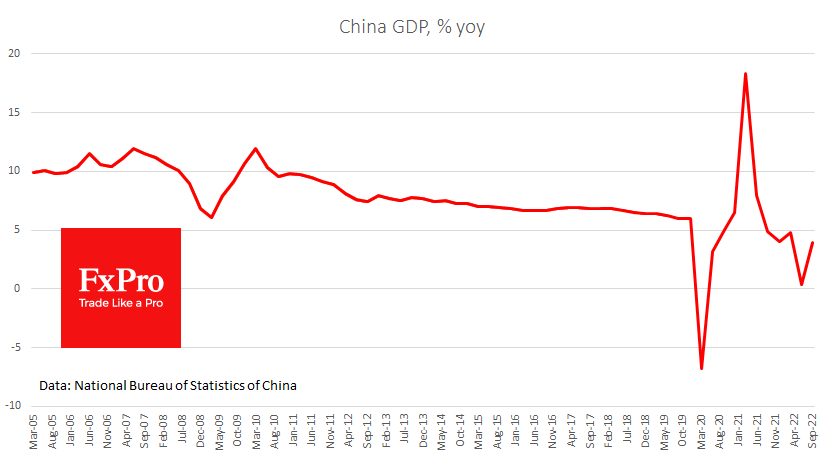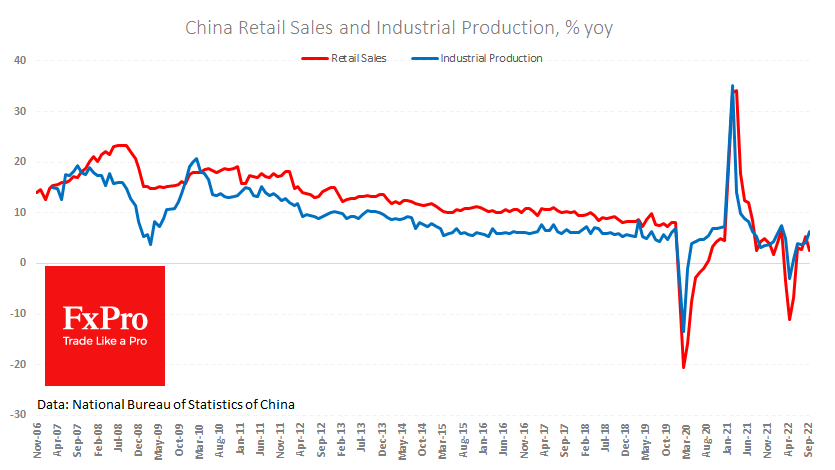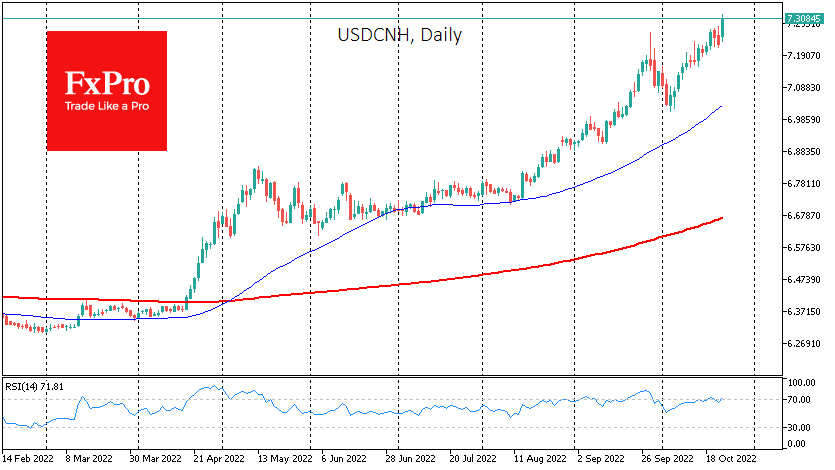After a delay related to the Communist Party congress, China published a batch of monthly and quarterly statistics, which caused mainly disappointing reactions from analysts.
GDP added 3.9% in the third quarter compared to a year earlier against expectations of 3.5%. In the three quarters, the economy added 3.0% over the same period a year ago against 2.5%, the first-rate increase in more than a year.
Also among the positive signals was a jump in industrial production by 6.3% y/y in September compared to 4.2% the month before and the expected 4.9%.
A trade surplus is also higher than expected, but an essential reason for its growth was a fall in imports rather than increased exports, which is not good macroeconomic news.
A very alarming signal was the cooling of retail sales from 5.4% to 2.5% (3.1% expected). Chinese government officials declare a further commitment to a zero covid expansion policy, potentially preventing economic activity from getting firmly back on the growth track.
An additional worrying factor for Asian markets is the reappointment of Xi Jinping for a third term. Investors are selling off Chinese assets on this news, suggesting a further course of austerity in the country, escalating tensions around Taiwan and anti-market reforms.
Contrary to the famous adage, markets have not been "selling the fact" of Xi's unprecedented third term, for which they have been preparing in recent months. The Chinese yuan has rewritten lows against the dollar since 2008, and the offshore USD/CNH exchange rate has surpassed 7.30. Key Chinese stock indexes are losing about 7% on Monday, pushing the Hang Seng index to lows since 2009 and the China H-share to 2005.
The FxPro Analyst Team
- English (UK)
- English (India)
- English (Canada)
- English (Australia)
- English (South Africa)
- English (Philippines)
- English (Nigeria)
- Deutsch
- Español (España)
- Español (México)
- Français
- Italiano
- Nederlands
- Português (Portugal)
- Polski
- Português (Brasil)
- Русский
- Türkçe
- العربية
- Ελληνικά
- Svenska
- Suomi
- עברית
- 日本語
- 한국어
- 简体中文
- 繁體中文
- Bahasa Indonesia
- Bahasa Melayu
- ไทย
- Tiếng Việt
- हिंदी
China Is Under Pressure
Published 10/24/2022, 08:32 AM
Updated 03/21/2024, 07:45 AM
China Is Under Pressure
Latest comments
Loading next article…
Install Our App
Risk Disclosure: Trading in financial instruments and/or cryptocurrencies involves high risks including the risk of losing some, or all, of your investment amount, and may not be suitable for all investors. Prices of cryptocurrencies are extremely volatile and may be affected by external factors such as financial, regulatory or political events. Trading on margin increases the financial risks.
Before deciding to trade in financial instrument or cryptocurrencies you should be fully informed of the risks and costs associated with trading the financial markets, carefully consider your investment objectives, level of experience, and risk appetite, and seek professional advice where needed.
Fusion Media would like to remind you that the data contained in this website is not necessarily real-time nor accurate. The data and prices on the website are not necessarily provided by any market or exchange, but may be provided by market makers, and so prices may not be accurate and may differ from the actual price at any given market, meaning prices are indicative and not appropriate for trading purposes. Fusion Media and any provider of the data contained in this website will not accept liability for any loss or damage as a result of your trading, or your reliance on the information contained within this website.
It is prohibited to use, store, reproduce, display, modify, transmit or distribute the data contained in this website without the explicit prior written permission of Fusion Media and/or the data provider. All intellectual property rights are reserved by the providers and/or the exchange providing the data contained in this website.
Fusion Media may be compensated by the advertisers that appear on the website, based on your interaction with the advertisements or advertisers.
Before deciding to trade in financial instrument or cryptocurrencies you should be fully informed of the risks and costs associated with trading the financial markets, carefully consider your investment objectives, level of experience, and risk appetite, and seek professional advice where needed.
Fusion Media would like to remind you that the data contained in this website is not necessarily real-time nor accurate. The data and prices on the website are not necessarily provided by any market or exchange, but may be provided by market makers, and so prices may not be accurate and may differ from the actual price at any given market, meaning prices are indicative and not appropriate for trading purposes. Fusion Media and any provider of the data contained in this website will not accept liability for any loss or damage as a result of your trading, or your reliance on the information contained within this website.
It is prohibited to use, store, reproduce, display, modify, transmit or distribute the data contained in this website without the explicit prior written permission of Fusion Media and/or the data provider. All intellectual property rights are reserved by the providers and/or the exchange providing the data contained in this website.
Fusion Media may be compensated by the advertisers that appear on the website, based on your interaction with the advertisements or advertisers.
© 2007-2025 - Fusion Media Limited. All Rights Reserved.
